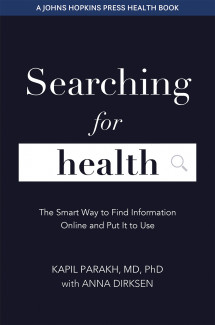
Johns Hopkins UniversityEst. 1876
America’s First Research University
Now Browsing:
The Benefits of “Searching for Health”

Over the span of just two weeks, there were three troubling health symptoms that caught people in my close circle completely off guard. The first friend started suffering from severe headaches every afternoon and evening, seemingly out of the blue. Another one noticed a sharp pain on the right side of her jaw which refused to go away. And a third woke up one day with pain shooting from her neck down one of her arms, which soon became near impossible to move. As each friend fell victim to a new symptom, the same question arose: What is wrong and how can I fix it?
We’ve all been there, scrolling through endless websites trying to make sense of some new symptom or illness that we know nothing about. I’ve been there myself, more than a few times. In some cases, it’s a small cough or inconvenient ache or pain. But there have been more serious situations as well. No matter the magnitude of the complaint, the feeling was invariable: confusion, fear, and frustration. When Kapil approached me about working with him on Searching for Health, I could relate to the stories he told me about his cardiology patients, stunned with a new diagnosis or fearful of what a troubling new symptom may indicate. Few things are more frightening than knowing something is wrong but not fully understanding what to do to fix it.
The reality is there are no perfect decisions when it comes to our health, but there is a confidence that comes with knowing we are making the best possible choices based on the information at hand. Kapil and I wrote Searching for Health to help people feel more confident at every stage of their health journey, from noticing a troubling symptom, to diagnosis, treatment, and long-term or follow-up care. In the book, we offer small, easy tips for each stage of the journey that will give you a leg up when making decisions about your health. We also included Kapil’s insights as a doctor, to give you a sense of how your healthcare providers may be processing information about your health and how you can work with them more effectively to find a solution.

The checklists and worksheets we include in the book have been among the most useful tools I’ve adopted in my everyday life. It’s changed the way I manage my health and my family’s health. I can only hope that it will change how you manage yours. Take the onset of illness, for example. When my temperature used to spike unexpectedly or I ended up with some mysterious pain or injury with no recognizable source, I — probably like most of you reading this article — would jump online to quickly figure out what could be wrong. Then, armed with whatever information I could find online, I would get in touch with my doctor, who would often have to walk me back about five steps, encouraging me to stop worrying and self-diagnosing but instead to simply explain the details of my symptoms and when they came on. I was once fairly convinced I had the beginnings of a tumor before I spoke with her and she (quite quickly) confirmed it was just a clogged gland. While a fun anecdote after the fact, the reality was that I worried unnecessarily for far too many days and then wasted the precious little time I had with my doctor listing off a series of conditions that I never even had.
Working with Kapil on Searching for Health has taught me how to handle that health situation — and other much more serious ones — far better. In the book and for free to download on our website, we’ve included worksheets that will help you track your symptoms, suggestions for how to have tough conversations with your doctor, and advice on how you might tackle some of the toughest health questions — including end of life decisions — that you’ll ever face. I’ve benefitted myself from having Kapil and his advice just a phone call or text message away. Now, with Searching for Health, you too can have his insight and advice close at hand as you take steps along your path to good health.
Order Searching for Health: The Smart Way to Find Information Online and Put It to Use at the following link: https://jhupbooks.press.jhu.edu/title/searching-health
Anna Dirksen, MSc, the director of communications at ACCESS Health International, is a public health communications advisor to governments, nonprofits, and multinational organizations. She is the coauthor of Voices in Dementia Care: Reimagining the Culture of Care, and with Dr. Kapil Parakh, she is the coauthor of Searching for Health: The Smart Way to Find Information Online and Put It to Use.
Learn more about Searching for Health on the authors’ website: https://www.searchingforhealth.org/

We’ve all been there, scrolling through endless websites trying to make sense of some new symptom or illness that we know nothing about. I’ve been there myself, more than a few times. In some cases, it’s a small cough or inconvenient ache or pain. But there have been more serious situations as well. No matter the magnitude of the complaint, the feeling was invariable: confusion, fear, and frustration. When Kapil approached me about working with him on Searching for Health, I could relate to the stories he told me about his cardiology patients, stunned with a new diagnosis or fearful of what a troubling new symptom may indicate. Few things are more frightening than knowing something is wrong but not fully understanding what to do to fix it.
The reality is there are no perfect decisions when it comes to our health, but there is a confidence that comes with knowing we are making the best possible choices based on the information at hand. Kapil and I wrote Searching for Health to help people feel more confident at every stage of their health journey, from noticing a troubling symptom, to diagnosis, treatment, and long-term or follow-up care. In the book, we offer small, easy tips for each stage of the journey that will give you a leg up when making decisions about your health. We also included Kapil’s insights as a doctor, to give you a sense of how your healthcare providers may be processing information about your health and how you can work with them more effectively to find a solution.

The checklists and worksheets we include in the book have been among the most useful tools I’ve adopted in my everyday life. It’s changed the way I manage my health and my family’s health. I can only hope that it will change how you manage yours. Take the onset of illness, for example. When my temperature used to spike unexpectedly or I ended up with some mysterious pain or injury with no recognizable source, I — probably like most of you reading this article — would jump online to quickly figure out what could be wrong. Then, armed with whatever information I could find online, I would get in touch with my doctor, who would often have to walk me back about five steps, encouraging me to stop worrying and self-diagnosing but instead to simply explain the details of my symptoms and when they came on. I was once fairly convinced I had the beginnings of a tumor before I spoke with her and she (quite quickly) confirmed it was just a clogged gland. While a fun anecdote after the fact, the reality was that I worried unnecessarily for far too many days and then wasted the precious little time I had with my doctor listing off a series of conditions that I never even had.
Working with Kapil on Searching for Health has taught me how to handle that health situation — and other much more serious ones — far better. In the book and for free to download on our website, we’ve included worksheets that will help you track your symptoms, suggestions for how to have tough conversations with your doctor, and advice on how you might tackle some of the toughest health questions — including end of life decisions — that you’ll ever face. I’ve benefitted myself from having Kapil and his advice just a phone call or text message away. Now, with Searching for Health, you too can have his insight and advice close at hand as you take steps along your path to good health.
Order Searching for Health: The Smart Way to Find Information Online and Put It to Use at the following link: https://jhupbooks.press.jhu.edu/title/searching-health
Anna Dirksen, MSc, the director of communications at ACCESS Health International, is a public health communications advisor to governments, nonprofits, and multinational organizations. She is the coauthor of Voices in Dementia Care: Reimagining the Culture of Care, and with Dr. Kapil Parakh, she is the coauthor of Searching for Health: The Smart Way to Find Information Online and Put It to Use.
Learn more about Searching for Health on the authors’ website: https://www.searchingforhealth.org/

Login to View & Leave Comments
Login to View & Leave Comments


